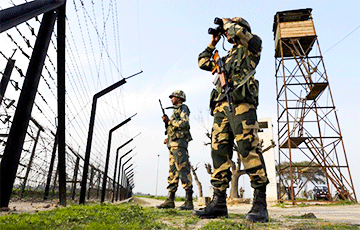India Has Launched A Series Of Strikes On Pakistan
14- 7.05.2025, 7:32
- 17,856

Islamabad responded.
India has launched strikes in Pakistan and Pakistani-controlled areas of Kashmir. This comes two weeks after New Delhi accused Islamabad of supporting militants behind an attack on tourists in the Indian-controlled part of Kashmir. Twenty-six people were killed then. Pakistani authorities denied the accusations, BBC reported.
"The Indian armed forces launched Operation Sindhur, targeting terrorist infrastructure in Pakistan and Pakistan-occupied Jammu and Kashmir from where terrorist attacks against India were planned and directed," the Indian army said.
Indian authorities claimed the missile strikes hit nine targets linked to militants, but Pakistani authorities denied this.
"Our action was targeted, deliberate and non-escalatory in nature. No Pakistani military facility was attacked. India has shown considerable restraint in the choice of targets and methods of hitting them," India said.
Reuters reported an anonymous source in Indian military circles as saying the missile strikes targeted bases of Islamist groups.
The Pakistani army said the strikes hit civilian areas and not terrorists. It said Indian planes launched the missiles from its airspace.
The Pakistani press service said the Indian strikes killed eight people, wounded 35 and left two missing. Earlier, Pakistan's army spokesman Ahmed Sharif told the BBC that two children were among the dead.
One of the strikes, Sharif claims, hit a mosque.
Pakistan's Prime Minister Mian Muhammad Shahbaz Sharif released a statement vowing to respond to India.
"The insidious enemy has launched a sneak attack on five places in Pakistan. Pakistan has every right to give a proper response and that proper response is already being given," the prime minister said.
Later on Wednesday night, the Pakistan Army spokesperson's office clarified that India had launched 24 separate strikes with different weapons on six places.
A Pakistani military spokesperson said Islamabad would "respond at a convenient time and place".
"All fighter jets of our Air Force have been put in the air. This is a shameful and cowardly attack that was launched from Indian airspace," he said.
According to reports from the Indian side, the Pakistani army opened artillery fire on the Kashmir division line.
Later on Wednesday night, the Pakistani army press officer said Pakistan had shot down five Indian warplanes, including three French Rafale fighters and two Soviet-Russian aircraft, Su-30MKIs and MiG-29s. There have been no confirmations or denials from the Indian side yet.
In addition, the Pakistani army says it destroyed the headquarters of an Indian brigade.
Pakistan has notified the UN Security Council that it reserves the right to respond to "blatant aggression on the part of India."
The Indian army's press office says three people have been killed on the Indian side. It told the BBC on Wednesday morning.
Indian authorities have closed all educational institutions in areas along the Line of Control. Pakistan has also closed schools in the capital, Islamabad (which is close to the Line of Control), and other border areas.
According to the Indian press, Indian Defense Minister Rajnath Singh discussed the strikes on Pakistan with the commanders of the Army, Air Force and Navy on Wednesday morning.
The two countries have been exchanging fire along the border in recent days. There has been speculation that India will retaliate with military strikes on Pakistan, as it did after militant attacks in 2019 and 2016.
"A huge gamble"
Anbarasan Etirajan
Anbarasan Etirajan
South Asia Editor, BBC World Service
This is a sharp escalation in the standoff between the two nuclear-armed countries.
That India might launch military action was expected, but the intensity of the missile strikes on Pakistani territory has surprised many.
India says some of the places it is bombing are linked to militants and there have been no strikes on Pakistani army installations.
Pakistan has vowed to retaliate, and its nature and targets will determine New Delhi's response.
The two countries believe they will succeed in keeping the escalation in check, but tensions are high and the course of any military conflict is difficult to predict.
In the past, the U.S. and other countries have intervened to contain escalation.
Now that the Donald Trump administration has been distracted by other global issues, it is unclear how quickly Washington will take containment action.
Political leaders in both countries will want to demonstrate that they have acted decisively and claim victory.
They have taken a huge gamble.











